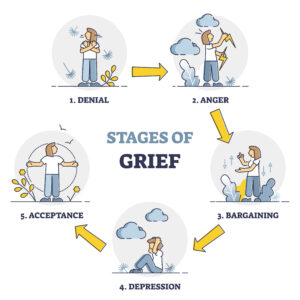Bereavement Counselling?
Bereavement comes in many different forms. It can be grieving the loss of a person or animal, who has passed or who is no longer in our lives because of a relationship breakdown or change of circumstance. We can also enter into a state of grieving whilst going through a transition period such as changing career, location or how we perceive our reality. All are valid.
At Leone centre, we recognise that each individual experiences grief and transformation in their own unique way, a bereavement counsellor will sympathetically help you with grief counselling techniques
The symptoms of bereavement and loss are therefore vast and layered. Perhaps they would be better expressed through a painting, a dance or the naked, searing truth of silence. It is an overwhelming feeling of grief or nostalgia that takes you under its wings and asks you to dream a while, in the sacred emptiness that the loss creates.
This feeling is often a painful opening of a portal, which eventually brings renewal and a deepening of compassion into our lives.
Throughout the process we may feel emotional despair, plummeting sadness, loneliness, emotional detachment, guilt, anxiety, anger and frustration. An influx of inspiration may come and an earnest reminder of what is really important. It is also common to seek relief from the hurt through numbing agents such as drugs, alcohol or constant socialising.
Bereavement Counselling can be a guiding anchor to help integrate the shifting tides of your loss into your life, in the healthiest way available. Leaning on the support network of friends and family, who are perhaps a part of the circle of grieving, is often very helpful. Introducing a trained counsellor into this network, can provide an emotionally stable setting for your grief to be fully expressed and witnessed.
Are there different types of grief?
Yes, imagine a mosaic of interconnected emotions, the image as a whole is the grief and each tile represents the multitude of various experiences grief creates.
Here is a list of some examples:
- Abbreviated grief – A child grieving the loss of someone they don’t know very well
- Absent grief – Parents who put their own grief aside in order to support their children
- Anticipatory grief – A person who has lost their independence and/or ability
- Complicated grief – When grief is persistent for a prolonged period of time and begins to interfere with day-to-day life
- Cumulative grief – Grieving multiple losses in quick succession
- Delayed grief – When there is a significant gap between the initial loss and the bereaved person’s reaction to it
- Disenfranchised grief – When the death of their loved one or the person whose death they mourn is not acknowledged, possibly due to stigma
- Distorted grief – A death which was caused by medical error or ignorance – I.e. the doctors failing to spot vital signs/symptoms or dismissing patient’s complaints altogether
- Masked grief – When a person is unable to recognise out-of-character symptoms and behaviours as reactions to their loss
Coping with Grief
Coping with grief is not a straight line journey. Swiss psychiatrist Elisabeth Kübler-Ross outlined 5 stages of grief – Denial, Anger, Bargaining, Depression and Acceptance. Misinterpretations of the stages of bereavement may leave a bereaved person questioning ‘Is it normal to feel this way?’ Which can lead to further distress and exacerbates loneliness.
Gregory details, Elisabeth Kübler-Ross’ model was based off her work with terminally ill patients and has received much criticism in the years since. Mainly because people studying her model mistakenly believed this is the specific order in which people grieve and that all people go through all stages. Ross now notes that these stages are not linear and some people may only experience some or none of them.
Navigating Grief
If you are grieving the loss of a loved one who has recently passed and you’re feeling an acceptance, this does not indicate that you are ‘grieving incorrectly’ or that you won’t start to feel a sense of denial in the future. Similarly, if you are grieving the end of a relationship and you felt acceptance 5 months ago and you are now feeling anger and resentment, it doesn’t mean you are doing anything wrong. It just means that you are human and you have had an attachment to a person or feeling and you are navigating your way into a new reality.

How long does grief tend to last?
How we manage periods of transition and change will impact how a bereavement affects our life. That being said, even if you tend to deal with change very well, there is no amount of preparation that will speed you through or step you over the inevitable pain that comes from grief. The two go together, just as pain and joy go together.
“Neuroscience research shows that the only way we can change the way we feel is by becoming aware of our inner experience and learning to befriend what is going on inside ourselves.” – Bessel A. van der Kolk, The Body Keeps the Score
How to tell if grief has become depression?
There is a fine line between depression and grief. Different cultures around the world have kept ceremonies alive which honour and celebrate death as a transformation. In the absence of guidance on relating to death, we can feel bewildered when we experience loss. Unconscious social expectations of how to handle grief, can result in a cutting off from the pain held within the body. In these cases, grief may progress to depression.
What type of therapy is good for grief?
It is also possible to experience depression due to treasuring the emotions surrounding your loss, because you identify them as the link which is keeping your connection to the deceased alive. There is no set time to go through a grieving process. It is highly recommended to seek Bereavement Counselling to help normalise the complexity of your feelings and understand your emotions, so that you can begin to welcome in a new way of being.
- About the Author
- Latest Posts
Co-founder and director of Leone Centre, 20+ years of experience supporting people, and offering valuable knowledge through Couples Counselling and Individual Counselling. Before becoming a therapist, I worked in the financial sector.

Get Started Today
with Leone Centre

BOOK NOW

Call us
020 3930 1007

View our therapists
Find your match



